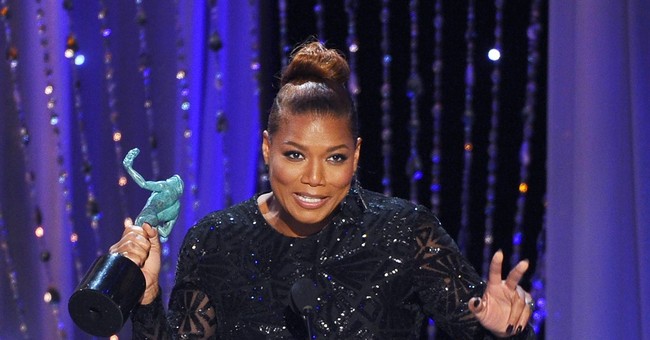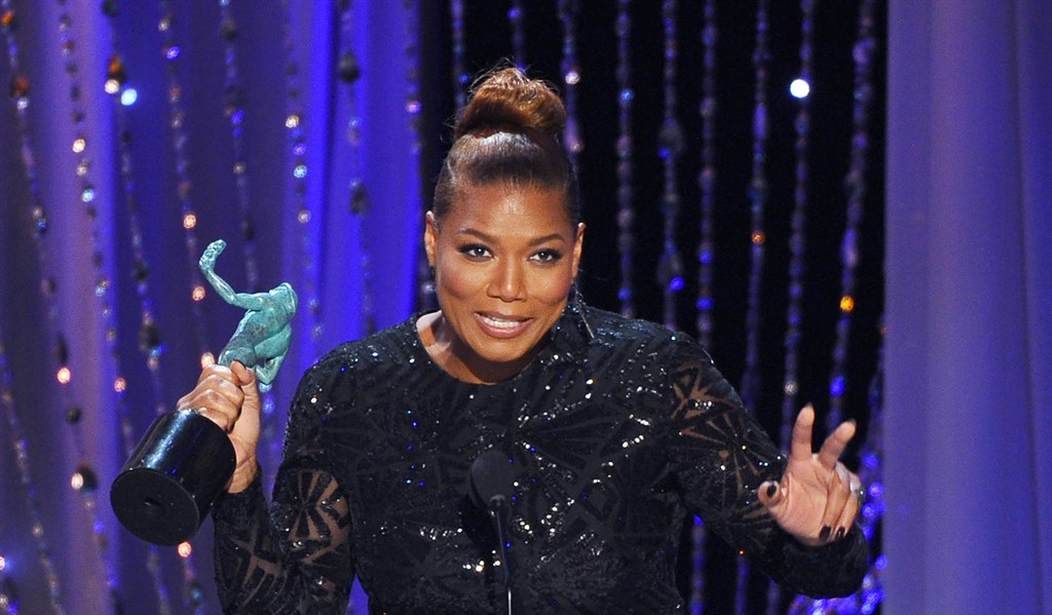
It’s been quite a week for “Gone With The Wind,” a classic movie that’s found itself caught in the middle of a cultural tug of war over race and politics, with strident, progressive voices forcing streaming service HBO Max to remove it. Then, just as quickly, the company backtracked by saying it will return with an introductory “context.”
Now, Queen Latifah, who portrayed Hattie McDaniel in the Netflix limited-run series, “Hollywood,” has spoken out about “Gone With The Wind”… and McDaniel herself. And some of the things she said just don’t match up with reality.
The NY Post reported that the actor and singer, in a recent interview with the Associated Press, gave her spicy opinion on HBO Max’s decision. She said, “Let ‘Gone With the Wind’ be gone with the wind.” They added that she didn’t appreciate how things went on the night of the Academy Awards. “[She] lamented the treatment of McDaniel, who wasn’t allowed to even attend the 1940 ceremony itself”:
“They didn’t even let her in the theater until right before she got that award. Someone came outside and brought her into the auditorium. She wasn’t even allowed to sit in there,” Latifah, 50, told the AP.
There’s a slight problem, though. It never happened. As Breitbart News wrote Tuesday,
Queen Latifah’s version of events differs from the accepted historical accounts of that Oscar night, which have placed McDaniel at a segregated table at the back of the auditorium.
The historical account was also reported in a 2015 Hollywood Reporter piece:
McDaniel then was escorted, not to the Gone With the Wind table — where Selznick sat with de Havilland and his two Oscar-nominated leads, Vivien Leigh and Clark Gable — but to a small table set against a far wall, where she took a seat with her escort, F.P. Yober, and her white agent, William Meiklejohn. With the hotel’s strict no-blacks policy, Selznick had to call in a special favor just to have McDaniel allowed into the building (it was officially integrated by 1959, when the Unruh Civil Rights Act outlawed racial discrimination in California).
Then the Breitbart News piece dropped this questionable quote from Latifah:
“And then after that, all she could do is play these same kinds of roles. So the opportinities of that time and the way those in power in that business were relegating us and marginalizing us and not allowing us to grow and thrive after that, you know, was just terrible.”
Even in her own time, McDaniel faced backlash “for portraying stereotypes on screen” from organizations like the NAACP, according to Smithsonian magazine. So, if McDaniel were alive today, she’d be no stranger to the criticism Latifah is dishing out. I think it’s only fitting that McDaniel respond to it, in her own words, from a 1947 open letter to her critics, published in the Hollywood Reporter.
[Note: I’m grateful to the Smithsonian magazine for its 2010 article, since some of the letter excerpts from a more recent (2015), Hollywood Reporter piece by Seth Abramovitch has been edited to omit them.]
In the letter, McDaniel expressed what it meant for her to win the Academy Award — the first by any black actor:
“My own people were especially happy. They felt that in honoring me, Hollywood had honored the entire race. That was the way I wanted it. This was too big a moment for my personal back-slapping. I wanted this occasion to prove an inspiration to Negro youth for many years to come.”
She made sure to talk about how Hollywood had changed – for the better – in the time she was there:
McDaniel wrote that the film industry had become a better place for black workers in the course of her career, and that black actors had gained recognition for their work.
And McDaniel stressed that she had “never apologized for the roles I play”:
“Several times I have persuaded the directors to omit dialect from modern pictures. They readily agreed to the suggestion. I have been told that I have kept alive the stereotype of the Negro servant in the minds of theatre-goers. I believe my critics think the public more naïve than it actually is. As I pointed out to Fredi Washington, “Arthur Treacher is indelibly stamped as a Hollywood butler, but I am sure no one would go to his home and expect him to meet them at the door with a napkin across his arm.”
Abramovitch noted that she was often quoted as saying, “I’d rather play a maid than be one.”
Another thing that Ms. Latifah should already know about McDaniel (since she played her) was that she became close, personal friends with Margaret Mitchell, the author of “Gone With The Wind.” They became dedicated penpals for the rest of their lives. In fact, as Atlanta magazine reported, in the days leading up to the film’s premiere, McDaniel started the ball rolling by writing in praise of Mitchell’s authentic depiction of the era:
“I hope you will not think me presumptuous for writing you,” the actress began deferentially. McDaniel went on to praise Mitchell for writing with an “authenticity” that echoed stories of the Old South she’d heard from her own grandmother, and, especially, for creating the character of Mammy and making her “such an outstanding personage.”
And it was that friendship that led Mitchell to become a generous donor to Morehouse College, a historically black college (HBCU), according to a theory by Andrew Young, a civil rights leader and the filmmaker of the Emmy award-winning, 2010 documentary, “Change in the Wind.”
In the AP interview, Queen Latifah bemoaned Hattie McDaniel’s inauthentic acceptance speech. “[S]he had to read a speech that was written by a studio. You know that’s not what the hell she wanted to say.”
Luckily, we have McDaniel’s own words, all these years later. Decide for yourself.
Watch McDaniel’s emotional acceptance speech for the 1940 Best Supporting Actress Oscar for her performance in “Gone With The Wind.”
h/t: @biasedgirl













Join the conversation as a VIP Member